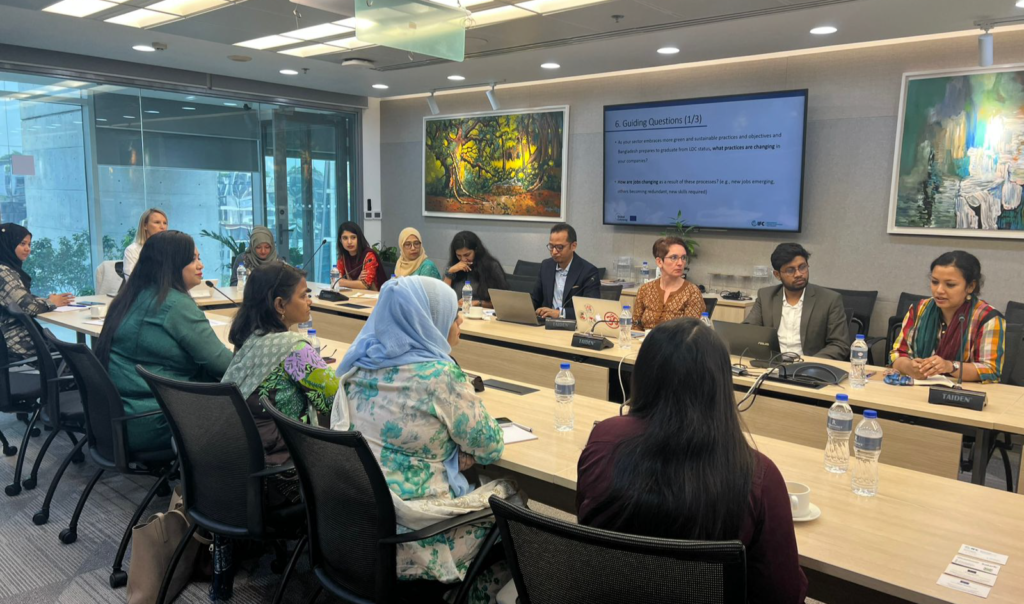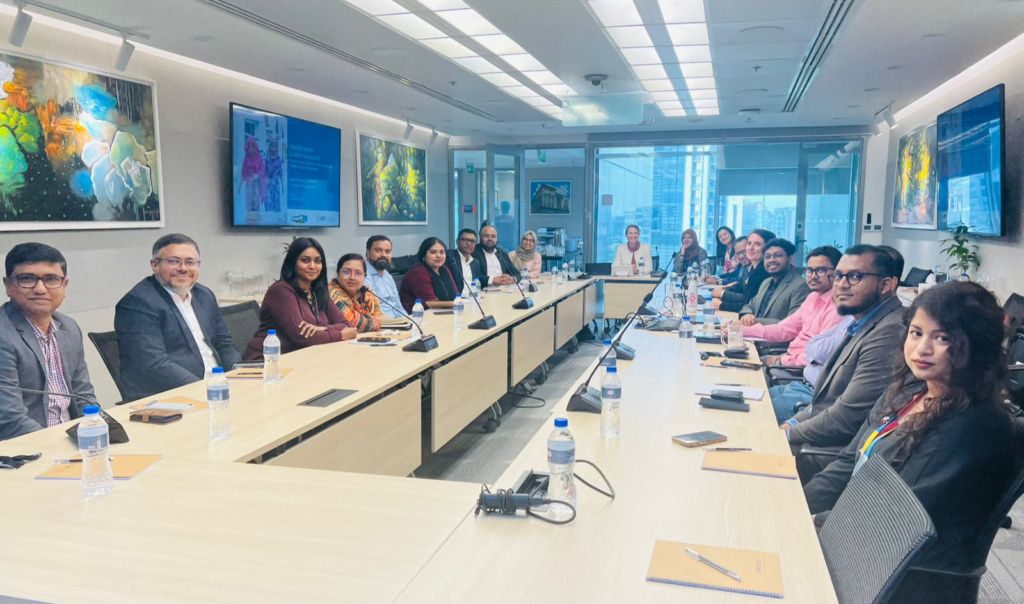
Bangladesh ranks 9th globally in terms of climate disaster risk (WorldRiskReport, 2023). Rising sea levels and recurrent flooding could displace up to 13.3 million people by 2050 (World Bank, 2022). More than half of the population already lives in areas of high climate exposure (USAID, 2018). Between 2000 and 2019, extreme weather caused over $37 billion in economic losses (Eckstein et al., 2021).
The government has made the green transition a national priority. By 2030, 15 percent of the annual budget will be climate-related under the Climate Fiscal Framework. The country’s Nationally Determined Contributions (NDCs) target a 21.8 percent reduction in carbon emissions, and the Energy Transition Roadmap aims for 15 percent renewable electricity.
Policies and investments alone cannot deliver a just and resilient transition. The private sector must play a leading role, and women must be included. Evidence shows that women’s participation strengthens resilience, drives innovation, and supports more inclusive growth.
Why Women Matter in the Green Transition
Women in Bangladesh are disproportionately affected by climate risks, but they are also an untapped resource for climate action. Limited engagement of women in private sector leadership constrains innovation and hinders the ability to attract the existing untapped talent pool. Research shows that companies with greater female leadership adopt stronger climate governance, commit more frequently to net-zero targets, and achieve measurable reductions in emissions, energy, and water use (IFC, 2022; Eckstein et al., 2021). Women-led enterprises also score higher on ESG indicators and invest more in sustainable practices when given access to finance, although credit and venture capital gaps persist (EIF, 2023).
For Bangladesh, where labour-intensive industries like RMG dominate exports and agriculture employs a large share of women, embedding gender into climate strategies improves productivity, drives innovation, and strengthens the resilience of communities and value chains.

Listening to the Sectors
The International Finance Corporation (IFC) commissioned a study, conducted by Innovision, to identify opportunities for advancing women’s roles in Bangladesh’s green economy. Innovision facilitated sector-specific roundtables on 25–26 August 2025, bringing together leaders from RMG, Renewable Energy, and Agribusiness. Key insights from the discussions include that the emerging occupations, especially STEM-based occupations, need to attract females in three sectors, existing practices that the private sector is undertaking in terms of supporting mechanisms to not only recruit but also to retain them, and creating cases for others to follow.
The discussions also focused on the key areas of engagement from the private sector to fill the existing gaps. Participants also highlighted the business incentives of having female employees in the workforce, as well as in leadership roles, in terms of productivity, efficiency, and revenue generation associated with it. They also shared existing best practices that the industry is currently undertaking to attract more female workers, especially in the STEM-based occupations and emerging new occupations. The discussions laid the foundation for the next course of action for both the private sector leaders and ecosystem actors.

Gender-Smart Recommendations for Implementation
The study aims to capture and translate these insights into sector-specific, actionable recommendations focusing on integrating gender and climate, with implementation requiring coordinated action across multiple fronts. This includes prioritizing private sectors in the policy making process while, integrating climate and gender policies; expanding technical and vocational training for women in renewable energy, sustainable manufacturing, and agribusiness value chains; designing green financial products tailored for women entrepreneurs; encouraging companies to adopt gender-inclusive sustainability strategies, set measurable targets, and track progress; and collecting sector-specific data on women’s participation in green industries to guide policy and investment decisions.
Bangladesh’s green transition offers a once-in-a-generation opportunity to reshape the economy. Including women at the center of this transformation can unlock productivity, innovation, and resilience across sectors and communities.
References
- WorldRiskReport. (2023) https://weltrisikobericht.de/wp-content/uploads/2024/01/WorldRiskReport_2023_english_online.pdf
- The World Bank. (2022). Country Climate and Development Report for Bangladesh. https://openknowledge.worldbank.org/entities/publication/1d6b85c3-4959-5f93-af88-dda33f52ee37
- USAID. (2018). Fragility and Climate Risks in Bangladesh. Strauss Center. https://www.strausscenter.org/wp-content/uploads/Country-Brief-Fragility-and-Climate-Risks-in-Bangladesh-2018.pdf
- Eckstein, D., Künzel, V., & Schäfer, L. (2021). Global Climate Risk Index 2021. Germanwatch. https://www.germanwatch.org/sites/default/files/Global%20Climate%20Risk%20Index%202021_2.pdf
- UNDP. (2020). Bangladesh Climate Fiscal Framework (Updated). United Nations Development Programme.https://www.undp.org/sites/g/files/zskgke326/files/migration/bd/Updated-Climate-Fiscal-Framework-2020.pdf
- European Investment Fund (EIF). (2023). Female access to finance: A survey of literature (EIF Working Paper 2023/87). EIF Research & Market Analysis. https://www.eif.org/news_centre/publications/EIF_Working_Paper_2023_87
- International Finance Corporation (IFC). (2022). Women on Boards and in Business Leadership: Driving Climate Governance. International Finance Corporation. https://www.ifc.org/en/what-we-do/sector-expertise/corporate-governance/women-boards-business-leadership
- EIB. (2021). Climate, Women, and Profits: The Business Case for Gender-Smart Climate Action. European Investment Bank. https://www.eib.org/en/stories/climate-women-profits
- Awan, U., Nauman, S., & Sroufe, R. (2024). Female CEOs and Environmental Innovation in the Energy Sector. Discover Sustainability, 5(1). Springer. https://link.springer.com/article/10.1007/s43621-024-00545-3